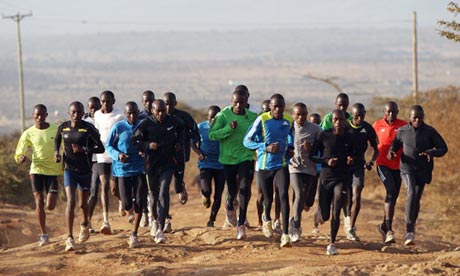
I've been a runner for more than half of my adult life, and for much of that time I've had a healthy cynicism about the role of easy, or "recovery", runs. I know runners who swear by them, and others who, like me, are unconvinced.
Runners are a compulsive bunch. It can take a lot of courage to decide to have even one rest day, but that option is always better than picking up an injury. A day off also means you benefit from two nights' sleep, and it's at night that your body makes the adaptations necessary for you to run further and faster. Ultimately, whatever level you're at, it's not the amount of training you can do that counts, it's the amount you can recover from. Training is all about adaptation, and as most runners are aware, the more you train, the more rest you need. The risk with doing even easy runs on tired legs is of doing more harm than good: they can be an effective way of turning a niggle into an injury, or a sore throat into a cold.
For me, though, the strongest argument for being cautious about these runs is that there are nearly always better alternatives, like cross-training (swimming or cycling), yoga or pilates, strength or core stability work, or some sports massage. All of those will almost certainly be more beneficial than an easy run, and without the pounding to your joints. And don't forget the option lots of runners find the most difficult: just take a complete day off. You'll not lose any fitness, and your legs will be a lot fresher when you next train.
London-based athlete and coach Shaun Dixon (of letsgetrunning.co.uk) says it's all about finding the right balance: "A good weekly training plan will be built around two or three key runs, with sufficient rest between each effort. For elite athletes, "recovery" often involves easy paced running. But for most runners, taking a full day's rest or doing an activity that involves less impact, such as cycling, might be more appropriate. Ideally you want to approach your key sessions feeling fresh, so you gain the most from them."
At the front of the training log I use is a section in which several former elite runners are asked how they would have changed their training if they were starting out today. Their answers are pretty revealing. Frank Shorter said: "I'd cut the mileage, the pounding, and emphasise the quality of everything." In a similar vein, the late Grete Waitz said: "I wouldn't be so afraid of taking extra rest days when tired. At the first signs of injury I would seek medical intervention."
Even the best runners in the world take days off: at last weekend's Millrose Games in New York, 38-year-old Bernard Lagat won the two-mile race in an astonishing 8:09:49. Lagat takes a day off every week and five weeks off every autumn. Fellow American Ryan Hall also takes one day off a week, having previously fallen into the trap of thinking that the way to run faster was simply to run more and more. That's when he remembered his coach telling him a quote from the composer Claude Debussy: "Music is the space between the notes." In other words, it's as important to rest as it is to run.
In my experience there's a lot to be said for making sure you're getting the most from your "quality" training sessions before you start adding recovery runs. If there is a good time for an easy run, it's when you're on the comeback from illness or injury, to bridge the gap between a period of inactivity and resuming your training.
If you're building up to a marathon, your overarching goal should be to arrive on the start line feeling fit and healthy (which can be a challenge in its own right). With that in mind, I'm convinced it's worth taking two days off after your longest training run(s) to allow your body a complete recovery. One approach would be to take the first day off and then do some cross-training or similar on the second.
Finally, some food for thought: last summer endurance coach Neil Scholes (of Kinetic Revolution) worked alongside the Kenyan Olympic team at their Bristol training camp prior to the London 2012 Olympic Games. Here are three of his observations on their training: "They are excellent at avoiding injury and would often not complete a set if they felt a niggle. This was not laziness. When they were tired they did not push; when they felt good they went flat out. When asked about their average weekly mileage, they had no idea."
James Ruskin studied sport & exercise science at Loughborough University

